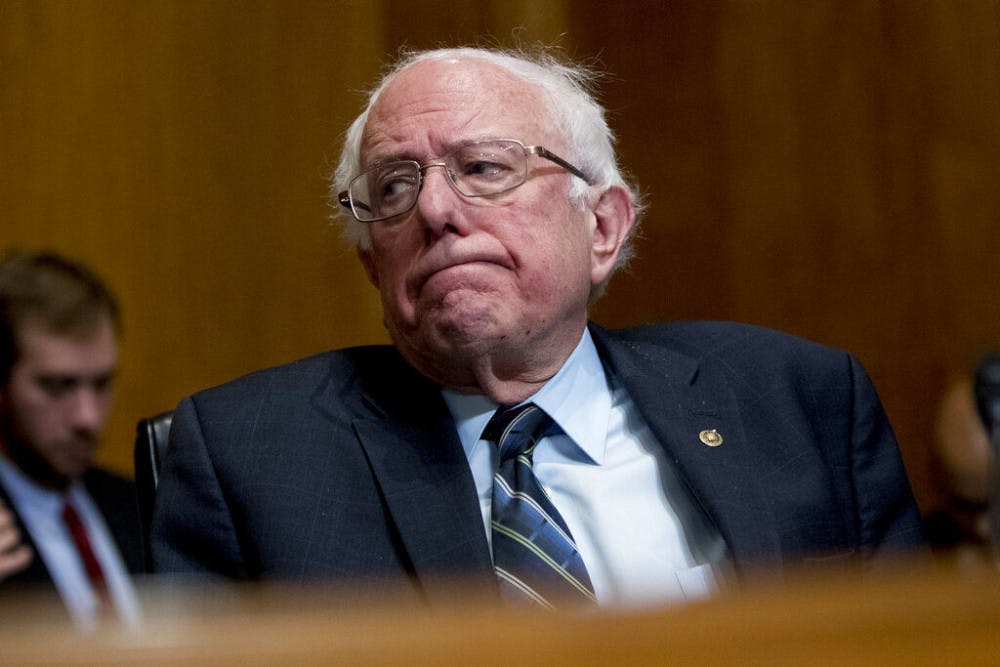Like every other young — borderline socialist — liberal college student in the United States, I was thrilled when I saw that Bernie Sanders had entered the 2020 presidential race. The optimist in me is rooting for Sanders to take control of the Oval Office. Unfortunately, the political science student in me understands that this probably won’t happen.
Sanders is on the extreme left side of the Democratic Party. Research has shown time and time again that in American politics, the more moderate candidate almost always comes out victorious. This is especially true when looking at national races where candidates need to appeal to an entire country of people and ideologies.
You’re probably wondering something along the lines of: “OK, but Trump definitely wasn’t moderate, so how the heck did he win?” Well, actually, many people believe that Trump is actually one of the most moderate Republican presidents the U.S. has seen since the 1970s — even if his reputation doesn’t exactly align with that.
The Washington Post actually published an article in 2015 explaining that Donald Trump meets the “textbook definition of an ideological moderate.” And Vox published one in 2017, stating that Trump won the election by running as a moderate Republican.
Don’t get me wrong, Trump was definitely extreme during his campaign, but he was not a conservative extremist when it came to his policy proposals. It is true that Trump made racist, sexist and generally offensive remarks that most levelheaded people would consider severely outrageous. But for most of his more extreme promises, like building a wall or eradicating Obamacare, he also loosely promised the public he would avoid cuts to the three largest welfare state programs and vaguely said he would work for some type of universal health care system. When you look solely at where Trump stood on the issues, he actually ran as a more moderate Republican — and that is how we ended up with President Donald Trump.
Sanders, on the other hand, is an extremist on all accounts. And this is likely why he lost the Democratic primary to Hillary Clinton in 2016. Although Sanders was the more likable candidate, Clinton was more moderate on the issues, so she garnered the necessary support to receive the nomination.
To many voters, the idea of Sanders in office would mean sudden and drastic changes to the way the country works. This fear of potential loss and change makes voters hesitant to support Sanders. This is largely due to the idea of “loss aversion,” which basically just means people are terrified of loss.
Psychologically, people consider the fear of loss to be twice as powerful as the opportunity for gain. So, even if people want what Bernie is offering, the idea that it might not work or that it could result in any sort of loss — financial or otherwise — turns voters away. In other words, voters choose the safest option.
All this being said and considered, a Sanders presidency isn’t out of the question. But maybe instead of “feeling the Bern,” he should encourage voters to feel lightly toasted.
I do believe that if Bernie is able to tone down some of his more extreme policies and consider compromising on less important issues, he can appeal to a broader range of voters during his campaign. Should he win the Democratic nomination, Bernie has the character necessary to take on Trump in debates and the likability to win favor across party lines — especially if he is able to present himself as a more moderate candidate in the months to come.
So, will Bernie soon be the newest resident of 1600 Pennsylvania Ave.? Right now, the odds are against him, but anything is possible.
Abigail Miller is a UF political science and journalism senior. Her column normally appears on Mondays.
FILE - In this Jan. 16, 2019, photo, Sen. Bernie Sanders, I-Vt., reacts during a hearing on Capitol Hill in Washington. The growing Democratic presidential field is increasingly splitting into two camps: those who want to quickly overhaul economic systems that have existed for decades and those who favor more gradual change. (AP Photo/Andrew Harnik, File)





![Photo of the missing Leachianus “Leachie” gecko. [Photo courtesy of Mike Southwick]](https://snworksceo.imgix.net/ufa/907bd92a-0b29-40eb-a5fb-d7db7cf98b2f.sized-1000x1000.jpg?w=1500&ar=16%3A9&fit=crop&crop=faces&facepad=3&auto=format)
